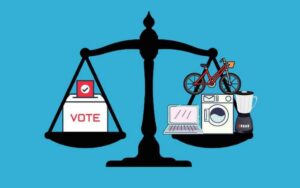
Supreme Court Suggests Minimum Vote Requirement for Unopposed Wins: A Step Toward Stronger Democracy
Supreme Court Suggests Minimum Vote Requirement for Unopposed Wins: A Step Toward Stronger Democracy
In a very important move, the Supreme Court of India recently proposed a significant reform for elections.
On 24th April, during the resumed hearing of a case challenging uncontested elections, the Court suggested that even if there is only one candidate left, they should still be required to secure a minimum percentage of votes to be declared elected.
A division bench led by Justice Surya Kant mooted the inclusion of an "enabling" provision in election law. The idea is simple but powerful: if there is only one contestant after all others have withdrawn, that person must still win the approval of a minimum number of voters — say 10%, 15%, or even more. This would ensure that elections truly reflect the will of the people.
Why the Supreme Court Raised This Concern
Justice Surya Kant explained that while uncontested elections are rare, there is still a real danger.
He pointed out that “there can be a case where one affluent candidate prevails upon all others contesting to withdraw.”
In such cases, the election would not be a true reflection of democracy but a victory by manipulation.
The judge elaborated that adding such a requirement would be a "very welcome and progressive step" for Indian democracy.
He stressed that our Constitution celebrates democracy, which is built on the idea of majority support. Therefore, even a single-candidate election should have some minimum backing from voters to be truly democratic.
The Petitioner's Arguments
The petition was filed by Vidhi Centre for Legal Policy, a well-known policy think tank.
They argued that Section 53(2) of the Representation of the People Act, 1951, along with Rule 11 and Forms 21 and 21B of the Conduct of Election Rules, 1961, should be struck down.
According to the petition, the current rules , which allow the election of lone candidates unopposed — deny voters the chance to reject a candidate through the NOTA (None of the Above) option.
In a democracy, voters must have the power to say "No" even when only one option remains. Denying this choice weakens democracy and leaves room for misuse.
The think tank warned that without proper checks, there could be situations where wealthy or influential candidates manipulate the system by forcing others to withdraw, thereby winning without real public support.
What the Court and Lawyers Said
Senior Advocate Arvind Datar, appearing for the petitioner, explained a hypothetical situation:
Suppose in a constituency of one lakh voters, only one candidate remains. If 25,000 voters want to vote for NOTA, and only 10,000 want the lone candidate, the people's voice should not be ignored.
Justice Kant supported this view, saying that even in an academic sense, requiring a minimum vote share would be a healthy reform. It would strengthen voter choice and uphold the spirit of democracy.
However, Senior Advocate Rakesh Dwivedi, contesting Datar’s view, said that uncontested elections are extremely rare. In fact, he noted that in the past 25 years, only one such case had occurred.
He also added that bringing minimum vote requirements would be a much larger reform, possibly requiring winners to secure at least 50% of total votes — a change Parliament would have to decide.
On the topic of NOTA, Dwivedi commented that NOTA has not significantly impacted election outcomes.
He said that although some candidates get fewer votes than NOTA, it does not change who wins.
Thus, he implied that NOTA’s practical effect on elections has been limited.
The Centre's Response
The Centre, represented by Attorney General R Venkataramani, largely agreed with Dwivedi’s position.
He said that even if something is desirable, courts cannot strike down existing laws on that basis alone.
The Court can suggest improvements, but changes must come through legislative processes.
Justice Kant clarified that the Court was not thinking of striking down Section 53(2).
Instead, it was only suggesting the addition of a new, enabling provision — a small but meaningful improvement to make the system stronger.
He emphasized that it would be wise to prepare in advance for possible problems.
Even if there is no crisis today, laws must be ready for tomorrow’s challenges.
After all, allowing someone to win without even getting 5% voter support is not in line with democratic principles.
Why This Matters
The Supreme Court’s suggestion has deep meaning for Indian democracy:
- Real representation: It ensures that elected candidates have genuine support, not just a technical victory.
- Protection against misuse: It prevents influential candidates from manipulating the process.
- Respecting voter choice: It gives voters the power to reject even lone candidates through meaningful voting.
- Strengthening democracy: It encourages more candidates, healthier competition, and a vibrant multi-party culture.
Justice Kant beautifully summed it up by saying that democracy should not just be about filling seats — it must represent the people's real will.
Conclusion
The Supreme Court’s idea to mandate a minimum vote requirement for unopposed candidates is simple but powerful. It respects the soul of democracy, the voice of the people and ensures that every leader has genuine public support.
Whether or not Parliament accepts this proposal immediately, the conversation has begun.
It shows that Indian democracy is alive, dynamic, and ready to meet future challenges with wisdom and strength.
As voters, citizens, and believers in democracy, we must celebrate such discussions and continue pushing for a system where every voice truly matters.